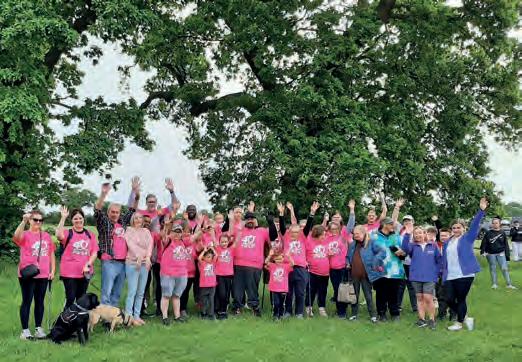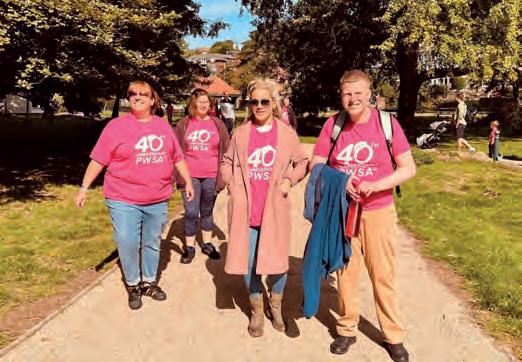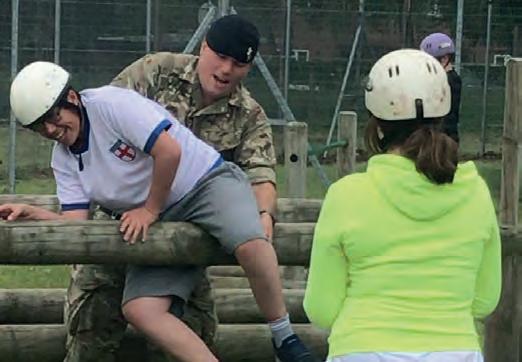













Chief Executive: Jackie Lodge jlodge@pwsa.co.uk
Fundraising Manager: Karen Wilkinson kwilkinson@pwsa.co.uk
Support Team Manager: Patsy Lecont plecont@pwsa.co.uk
Communications Manager
Jonathan Horsfall jhorsfall@pwsa.co.uk
Support and Training Officer: Ruth Consterdine rconsterdine@pwsa.co.uk
Support and Training Officer: Sheila Inwards sinwards@pwsa.co.uk
Support and Training Officer
Sarah Brindle sbrindle@pwsa.co.uk
Office and Finance Manager
Vicki Cooke vcooke@pwsa.co.uk
Office Administrator: Lizzie Pratt lpratt@pwsa.co.uk
Volunteer Office Assistants: Lesley Hallam Janice Rostron Glyn Hallam Sarah Rostron
Welcome to your summer 2023 edition of PWS News. I hope you’ve all been enjoying the hot, sunny weather that we’ve been experiencing – although, given how changeable the weather can be, it may not be so warm and sunny by the time you read this!
In this edition, we throw the spotlight on the subject of transitions. When we talk about transitions, we are referring to changes from one stage of life to another, so, for example, the move between schools, from child services to adult services, or from the family home to either residential care or supported living. However, we are also thinking about the little transitions in life that, if done correctly, can help with the larger ones, such as moving from one activity to another, moving through the school years, or indeed any situation where there needs to be a switch in focus and a change from the norm.
As always, we hope you find this useful and informative. Please do continue to give us your feedback about this magazine – it helps us to better understand what our sort of information our community will find most helpful. If there’s anything you’d like to see I future editions, then please do let us know! In this issue, we also have pictures and reports from our first two community weekends of the year – Sundrum and Skegness, as well as photos from Awareness Month in May. Until next time, wishing you all a fantastic summer!
Jonathan Jonathan Horsfall Communications Manager jhorsfall@pwsa.co.uk
GDPR: please keep us updated so we can keep YOU updated
The current GDPR regulations came into place on 25th May 2018. As this was five years ago, it’s now time for us to check and confirm whether you still give permission to PWSA UK to store your contact details and contact you. Did you also know you can give parental/guardian consent for under-16s with PWS to be added to our database? This means that when they turn 16 years old, we can automatically send them out a letter inviting them to become a member of the Association free of charge. This will enable them to be invited to our many events specifically for adults with PWS, including online Zoom sessions such as bingo, craft activities and much, much more. Please note this will mean we need a valid email address to add onto our database to receive the virtual invitations.
Please could you take a few minutes of your time to complete the GDPR form at pwsa.co.uk/gdpr to ensure you will still receive all the most recent updates from us, including community events, fundraisers, our mailshots and the latest information available to us on research. If your previously completed GDPR form expires and we have not received an updated form, we will have no alternative but to remove your details from our system and we really do not want you missing out!
We are trying to operate in the most paperless way possible to help go green but also to save money on vital funds the Association needs to enable us to continue supporting our community, so if you do need a paper copy of the form sending out instead, please email admin@pwsa.co.uk or call 01332 365676.
The GDPR form is suitable for all of our community so even if you are unsure whether you need to update it, please just complete the form anyway and we can update our database with the new commencement date, meaning we will not have to bother you with it for another 5 years!
Other portals into the PWS World/Community include: PWSA UK Website: www.pwsa.co.uk
Twitter: @PWSAUK
Facebook: Prader-Willi Syndrome Association UK
PWSA UK Community Hub: Empowering Life with PWS
Facebook community groups: PWS Families; PWS Siblings UK; Prader-Willi Syndrome Support UK; Lovebugs of the UK (PWS); PWS Adults & Carers Unite
Instagram: PWSAUK
PWSA UK Address
PWSA UK, c/o Metcalf’s Commercial Decorators, 3 Deer Park Road, Moulton Park, Northampton, NN3 6RX T: 01332 365676 • E: admin@pwsa.co.uk • www.pwsa.co.uk
Royal Patron: HRH Princess Michael of Kent Patron: Prof AJ Holland
Office opening hours: 9.00am - 5.00pm (Mon-Thu) and 9.00am – 1.00pm (Fri). Answerphone available at all other times
PWSA UK Sibs Hub (closed Facebook page for siblings)


Welcome to our summer support section. We have decided to look at transitions for children and adults as we face many changes in our lives and know how important it is for people with Prader-Willi syndrome to have things in place to support them.
So, what does transition mean? Transition is defined as being the time it takes to make a change from one place or stage of life to the next.
Each of the transitions our children and adults go through are tough on the parents as well, and can lead to a multitude of emotions. Please remember that we are here to listen and support you through these times, and together we can achieve positive outcomes.
As with every child, there are many transitions in life and for those with PWS, it is important that everyone involved understands the support and planning needed for these times. Decisions can include attending an early years setting such as nursery, playgroup or childminder, schooling, and whether they are mainstream or specialist settings.
These are just some of the decisions to be made –remember, transitions can also be from one activity to another, from one class to another, and from one setting to another. We have put together the information below to help guide you through transitions in childhood that you may come across.
What makes a transition successful?
Good communication
Consistent messages from children’s services.
Consistent messages and a clear understanding between early years settings, schools and EHCP case managers
Access to information in relevant formats
A clear understanding of your child’s condition
It is really useful to have a couple of favourite activities to support a transition, whether this be from one
Our Vision:
Overcome the challenges of Prader-Willi syndrome.
Our Mission Statement:
To ensure every member of the PWS community has access to high quality care, opportunity and support, and to promote awareness, build knowledge and further research in order to overcome the challenges of PWS.
We all think about transition between schools, from child services to adult services in health and education and, finally, the transition from home to either residential or supported living.
What can be forgotten are all the little transitions in life that, if we get them right, can help with the larger ones. These can include moving from one activity to another (for all ages), moving through the years in school, going from home to a short break or respite, basically anything that means there needs to be a switch in focus and will be a change from the norm. As many of you know, people with PWS benefit from routine, and a change in routine can be as challenging as a transition - from early years to primary, moving home even if with the family, changing dentists or doctors or going somewhere different on holiday.
Implementing strategies/activities that help them to switch focus from one to another can also benefit them with larger transitions. We hope you find the information useful and as always, we would appreciate any feedback that can help us to ensure we are keeping up to date with our community and developing our information sheets using your experiences.
activity to another, or going through the education system and here are some that may help:
Adapting songs, most children love singing and can have so much fun, examples such as: “If you’re ready for a story, find a seat! (clap, clap). If you’re ready for a story, find a seat! (clap, clap). If you’re ready for a story, if you’re ready for a story, if you’re ready for a story, find a seat! (clap, clap)” (to the tune of ‘If You’re Happy and You Know It’).
Fill a spray bottle with water and add a label that says ‘magic mist’. You might add a few drops of their favourite scent if they don’t have sensitivities to smells. Explain to your child that when you spray them with the magic mist, they will become quiet and show you they are ready to listen.

Want to be kept up to date with the latest news?
PWS Weekly Round-Up is a great service offered by the Association to keep you informed about training, family and fundraising events, new research and much, much, more! If you would like to sign up for this service, please contact Jonathan at jhorsfall@pwsa.co.uk or call the office.
Most pre-school children know the ‘standard’ cleanup song, but there are many other things you can do to encourage them to tidy up before moving on to another activity:
Tell your child that you are going to use STRONG muscles to clean up the room. Get them to practise flexing their muscles and then continue building their muscles by picking up.
Human Vacuums – another idea is to have them become vacuums. Ask them to hold out their arms like a vacuum hose and make vacuum noises as they pick up.
Time Challenge – even a young child likes a challenge. Set a timer and challenge them to clean up the room before the timer goes off. Or, play a song and challenge them to complete pickup by the end of the song.
What’s In My Sack? Have a special, colourful bag that contains a special object related to the next task. When you get the bag out, let them ask
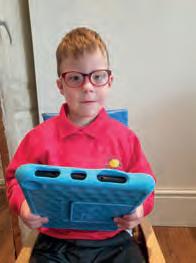
Sometimes, this can be harder for the parent/carers than the child. This may well be the first time you have entrusted the care of your child for a long period of time with someone that is not a family member or friend. However, if you have been supported by the setting and, if necessary, an EHCP case worker, this will help make it an easier transition for you and your child. It’s important that you are happy that everything is in place and that staff have an understanding of PWS.
So, what can you do to help with transition?
Talk to the setting, offering them information about PWS, especially where it is specific to your child.
Point them in the direction of PWSA UK for training.
Print off or direct them to the PWSA website where there are information sheets for early years settings, primary schools and secondary schools.
questions and make guesses to solve the mystery of what they’ll be doing next. There’s no better way to spark interest and get children involved, and this is a particularly good activity for introducing new teachers or classroom settings! Simon Says - Play this game to get your child listening. The minute you say “Simon says”, they will perk up to listen. Start by playing the game to get them into a line or wherever you need them to be. Once there, play the game for a few more minutes having them do different things with their hands (on their head, on their shoulders, covering their mouths, etc). The last “Simon says” can be something like “Simon says… if you’re ready for our reading time, show me by being ready for the activity.”
Children and adults with PWS benefit from visual cluesall of the above are not only visual, but fun and may be similar to what their setting will use. It will not do any harm to share one that works well with the early years setting or school.
Visit the setting, more than once, if necessary, in advance and with your child, giving them lots of opportunity to explore.
If possible, take photos so you can show them when you get home to remind them of what they will be doing and of people who will be there to support them.
These photos can be used as often as needed and it can be really useful to update them showing your child in the setting doing the activities.
Ensure the setting understands the importance of routine for your child, and that transitions between activities must be supported.
You always have the right to go back and ask questions, and to start a discussion. The more your child can see you trust the people supporting them, the easier their trust can be developed. It also puts our minds at rest and helps us to move forward.
Ask to see their policies - this will give you information on how they plan to settle and support children with special education needs and will give you a basis to ask questions and plan together the transition into school.
by Rebecca Craig, mum to Ellie
After just over a year off on maternity with Ellie, it was time to head back to work part-time. With any child, this feels hard and the thought of getting it right for Ellie seemed even more challenging.
We live in rural North Northumberland and there are not that many options
to begin with. With my older children, they both went to a childminder for that home-to-home feeling. However, this didn’t feel right for Ellie - we have a lovely childminder on our street, but I am conscious that she has a number of older children after school and I was concerned about keeping Ellie food-safe. We decided to look into nursery for Ellie
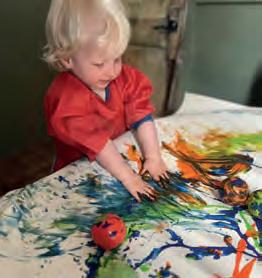
as we felt there would be much more structure around food and snacks.
There were just two nurseries in the area that would be ideal in terms of travel for me to work so we started with these. We didn’t consider special needs nurseries at this point as I am very much in the camp that we will cross into that lane if we need to, but otherwise we want to give Ellie the opportunity to develop alongside her peers.
I organised a visit to both nurseries and looked in detail at the menus: food is a key area for us at present. I have read and researched a lot regarding diet and PWS, I am very conscious that as there are no treatments for hyperphagia, that offering a very healthy diet full of wholefoods, complex carbohydrates and very limited sweet foods is one of the few things we as a family can do to support her. I already preferred one particular nursery out of the two just by looking at the information online and reading menus and SEN information on their page. They have their own cook, they produce a range of home-made meals, they only offer water and milk as drinks, and desserts are fresh fruit and yoghurt.
fruity snack twice daily, plus fruit after dinner.
Ellie loves attending nursery. She currently goes two days a week, even while I am on maternity leave with Alfie, as it has been so good for her development. We have been really pleased with nursery and the staff absolutely love her. Her key worker, Ali, is the SEN lead in the baby room and she has been learning Makaton to help with Ellie’s communication. Ellie has stayed in the baby room for now as she has only just started to walk but she will soon move up to ‘Twos’ once the staff feel she is confident enough with her walking to keep up; in the meantime, she goes through to the Twos room to take part in some of the activities with her peers. The nursery are already working on her EHCP application, and have been great at providing reports for DLA applications etc. Ellie’s physiotherapist and portage worker also go into nursery periodically to make sure that we are all working to the same goals in terms of her development. I am so pleased that nursery has been such a good experience and that it is working so well for Ellie.
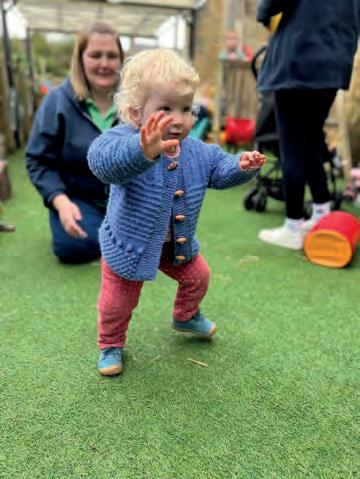
We went to visit this one first and loved it straight away. The staff were extremely friendly, they wanted to learn about PWS and what Ellie’s needs are, they were happy to accommodate her, and I just got the right vibe. The nursery is independently owned and Lucy who owns the nursery is hands on and was very keen to offer any support that we need. We decided straight away that this was going to be the right place for Ellie and didn’t even go to look at the other nursery.
Before Ellie started, we looked at the fortnightly menu and I colour-coded the food choices to:
Green – Happy for Ellie to eat with correct portion size,
Yellow - Happy for Ellie to have but the carb needs to be wholemeal,
Red – Don’t want Ellie to have.
The nursery offered to provide her with wholemeal alternatives on days where wholemeal wasn’t being given and now give all the children wholemeal pasta, rice and bread as the default! On days with a red choice, they give Ellie an alternative meal. I was really pleased that the menu was predominately green and yellow. I feel lucky that they have been so accommodating –however, the nursery say they already accommodate many different diets and Ellie’s isn’t so hard, it’s just healthy eating. At snack times, the children get fruit, and instead the nursery provide Ellie with veg items such as cucumber, carrot or cherry tomatoes, which works really well for us too, as I was concerned that she could end up having a lot of fruit in a day if she had a
Our top tips:
Know what your priorities are for your little one and see how the setting can accommodate those.
Visit the setting, chat with the staff and see what vibe you get.
Go with your gut instinct and don’t feel pressured to take a place somewhere that you don’t feel comfortable.
If something happens that you're not happy with, chat with the staff or drop them an email, they are all just learning too, and they appreciate the feedback in a calm way.
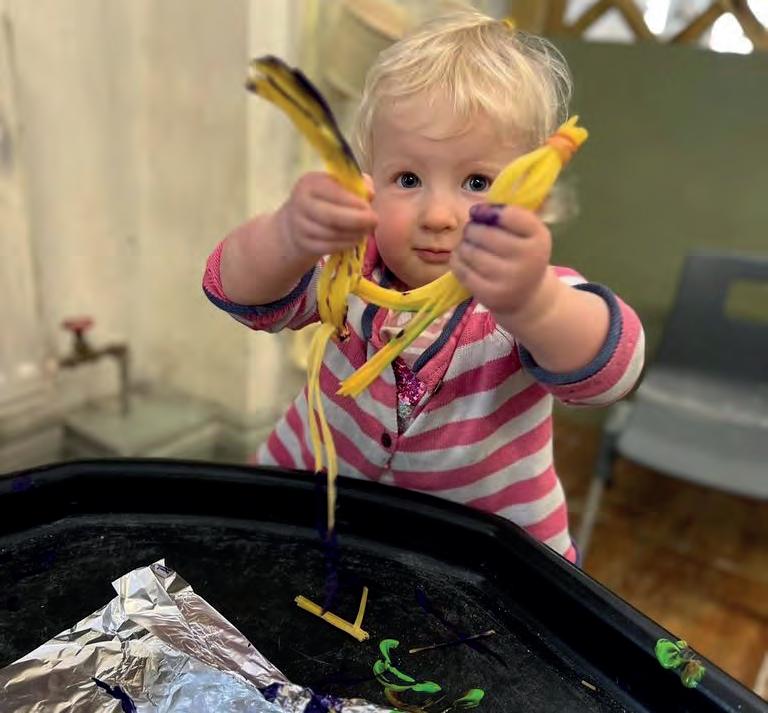
Some of our children start straight off in special needs schools, others transition during primary, and some continue mainstream throughout education. What is important, whichever route they take, is the transition from one setting to another: Information shared between schools must be accurate.
Transition planning needs to be done within a timescale that allows for schools to view the EHCP, if they have one, and ensure they can meet needs. Even without an EHCP the schools still need to understand PWS and have plans and strategies in place.
As with primary schools, look at their policies and procedures.
Opportunities for your child to visit and, like primary, visual reminders can be very important.
All educational settings, including early years, are inspected by Ofsted and you can look at Ofsted reports to gauge the skills in a setting supporting children with special educational needs. This can be useful to do prior to contacting or visiting the setting as it may provide you with questions you can ask. All reports can be found at reports.ofsted.gov.uk. However, all settings must have their inspection report displayed and most have them on their websites.
This is a quote from an early years Ofsted report that would give you an indication of how the setting would help your child to transition from home to there: “They recognised that some children were less confident in engaging in discussions with other children and adults. The good quality teaching now means that from a young age, children convey their needs clearly and build their vocabulary as they hear a greater range of words in stories, conversations and by singing songs and rhymes.”
This is a quote from a primary school Ofsted report: “In the Reception class, children get off to a good start and achieve well. Parents appreciate the level of involvement in their children’s learning in the early years.” This is not only important for your child’s learning but shows parental involvement which is really important for transition but also for supporting PWS.
Knowing background information on the early years setting or school can help you to ask appropriate questions, understand how they work and how this can benefit your child, always ask any things you do not understand or have concerns about from the report.
Check the school has a clear understanding of PWS and if necessary direct them to PWSA UK website where they can find training or videos to help. Offer your child many opportunities to ask questions, know the children they will be moving on with, and prepare them for the ones they will be saying goodbye to.
Moving on to secondary, their routines may change, and they will be having different teachers for subjects. Making time for them to meet their teachers and see the different classrooms is really helpful, although not always possible but worth trying for.
Below is a reminder that reading Ofsted reports prior to picking a school can be helpful - looking for comments made by the inspector that can be informative about working with parents and inclusion.
Transition to adulthood can be very difficult to navigate for those with PWS and for their families. There are some big decisions to be made when moving towards adulthood around education, future accommodation, managing finances, making friendships and transitioning from children’s to adult services in health and social care. We have put together some information which we think will help on this journey.
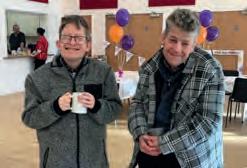
Success in transitioning to adult services relies on: Good communication
Consistent messages from children’s and adult services. Access to information in relevant formats
An understanding of your young person’s condition. Life changes: independence and safety
This is an area that is difficult for any young people with a learning disability/difficulty let alone adding PWS and the issues around food into the mix. Creating opportunities for independence whilst ensuring that there are no risks of accessing food can be challenging. Ensuring social workers and care workers understand the implications of this aspect of the syndrome is vital, and this is often where we can provide support, guidance and information. Unfortunately, we often get called upon to help when things have gone wrong and so providing this information early is essential in the planning stages.
As well as the potential to need help with activities and personal care, it is likely that your young person will need one-to-one support to manage their diet. They may have been used to having restrictions in place, such as a locked kitchen and/or cupboards However, implementing this in a new setting may require a mental capacity assessment. Again, this is an area we can support you with. Your son or
daughter may need help with travel, and to be escorted outside rather than going into town on their own. They may need support to take medication and might need prompting with regard to personal care.
Relationships
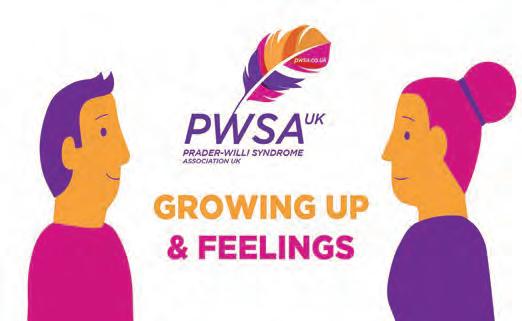
Another aspect of life that will almost certainly change in the move towards adulthood is the nature of friendships and relationships. It is inevitable that friendships will come and go as young people move on from school or college and into other learning or workbased environments.
Parents may have worries and concerns about their young adults developing sexual relationships and this is something that is often brushed aside by parents and professionals. Sexuality and sexual relationships with boyfriends/girlfriends feature as important issues in transition to adulthood.
However, parents involved in Heslop et al's (2002) study described feeling 'at a loss' as to where to go for advice or support. Please watch our Growing Up with PWS animations on our website - they cover these issues and help young people to stay safe.
Changes in legal status: the legal right to make their own decisions, with support if necessary

You may already be an appointee for your young person’s Disability Living Allowance (DLA). However, this will not automatically renew with Personal Independence Payments (PIP) and you will need to apply again. You can ask for the ‘Appointee Form’ when you apply for PIP.
Many young people with learning difficulties have reported worries and difficulties when it comes to managing money (Ward et al, 2003). Learning how to budget appropriately are important aspects of the transition to adulthood, yet few of the young people involved in Heslop et al's (2002) study managed their own money or received support to do so. Of course, there are extra difficulties for those with PWS wanting to manage their own money, with the risk being that they will use it to buy food. This is another area where a mental capacity assessment may be required.

There are so many decisions to be made during the transition process, some small and some life changing. Throughout their life, young people with PWS may have been shielded from having to make decisions or they may have been encouraged to practise this skill but on a very limited basis - for example, rather than “What would you like to eat tonight?”, you may have asked “Do you want pasta salad or chicken with rice?”.
Choice can be overwhelming for individuals with PWS and again, this is something that professionals need to understand, especially when it comes to choices around food. Professor Tony Holland, in his paper about Mental Capacity in PWS, talks about the person’s ability to make ‘reasoned decisions’ about food. It is extremely rare in PWS to be able to do this, despite the ability to demonstrate an understanding for the need to have a restricted diet. At PWSA UK, we unfortunately see examples of young people who have been deemed to have capacity around food once they reach adulthood, which has then led to rapid weight gain. It is vital that professionals involved in planning for your child’s future have a good understanding of this area of the syndrome.
We all know that individuals with PWS find even small changes difficult to cope with so leaving school may involve big lifestyle choices about whether to go to another school or to a local college or to go away to college.
A study conducted by Heslop et al (2002) found that the following factors made the transition from school easier for young people and their families:
Regular visits to possible future settings or new learning environment
Involving the young person in decisions about moving to a new setting
Positive support, encouragement and information for young people and families from the school/college
At PWSA UK, when we are involved in transitions, we always stress the importance of getting the environment right for the young person right from the start and this usually means ensuring that staff in the setting have a good understanding of the individual’s needs with particular emphasis on their condition.
Moving away from the family home
Have a look on our website under ‘Residential Care and Supported Living- information for parents’. There is also an ‘Easy Read’ document about moving away from home on the ‘I Have PWS’ page of our website.
The local authority transition process
Have a look at your local authority website for information on their role in supporting your young person and you through the transition process. This link is an example from Leicestershire County Council: www. leicestershire.gov.uk/education-and-children/specialeducational-needs-and-disability/preparing-foradulthood/becoming-an-adult-how-our-help-changes
The following link is to a document called ‘My Journey to Adulthood’. Again, this is from Leicestershire County Council but other local authorities should have something similar: www.leicestershire.gov.uk/sites/ default/files/field/pdf/2021/10/7/my-journey-toadulthood-information-pack.pdf
Some local authorities also run information sessions and support groups for parents.
Mencap has a really useful guide to transitioning to adulthood which talks about how your family members rights change as they become an adult. you will find on their Guides page here: www.mencap.org.uk/ advice-and-support/wellbeing/displaying-challengingbehaviour/meeting-challenge-guides-families
Benefits/financial help

When your young person reaches 16, they will stop receiving Disability Living Allowance (DLA) and move on to Personal Independence Payments (PIP). You can find excellent information on our website, with guidance on how to apply for these benefits here:
www.pwsa.co.uk/financial-help
There is also information about this on the government website: www.gov.uk/government/publications/ personal-independence-payment-changes/movingfrom-disability-living-allowance-dla-to-pip-changes-topip-law-from-23-november-2017
Other good sources of information on benefits include Turn2Us and Citizens Advice.
Further reading
National Development Team for Inclusion is a social change organisation working to enable people at risk of exclusion due to age or disability, to live the life they choose. They have some very useful information about the transition to adulthood on their website here: www.ndti.org.uk/resources/preparing-for-adulthoodall-tools-resources

Moving from Children’s to Adult services in the NHS in England, Wales, Scotland and Northern Ireland
1. www.england.nhs.uk/atlas_case_study/supportingyoung-people-through-transition-into-adult-careservices/
2. gov.wales/managing-transition-childrens-adultshealthcare-services
3. www.gov.scot/publications/supporting-disabledchildren-young-people-and-their-families/pages/ adult-health-and-social-care/
4. www.niccy.org/publications/2012/september/13/ review-of-transitions-to-adult-services/
CQC report ‘From the Pond into the Sea’ – 2014
Key messages
1. Commissioners must listen to and learn from young people and their families
2. Existing good practice guidance must be followed to ensure young people are properly supported through transition.
3. GPs should be more involved, at an earlier stage, in planning for transition.
4. Adolescence/young adulthood should be recognised across the health service as an important developmental phase
Read more at: www.cqc.org.uk/sites/default/files/ CQC_Transition%20Report_Summary_lores.pdf
SCIE - Social Care Institute for Excellence has produced a document called Preparing for Adulthood, the Role of the Social Worker, which you can read here: www.scie.org.uk/files/children/transition/socialworkers-role-supporting-learning-disabilities/sciepreparing-for-adulthood.pdf
This is a wonderful story from a young lady with PWS, who was leaving her mum’s home to move into her own. Even though the transition is a short one from mum’s house to literally living next door, for Jo it is a transition in independence. This has been a very exciting opportunity and with the help of her mum and sister, she has gained some independence but realises how she still benefits from their continued support. So much of our children and adults’ lives are dictated by what they can do, what we know is safe for them to do and of course relying on services to provide the support they need. Helping them to make some decisions on their own and with support is beneficial for their well-being and as you will see below, the family supported and then stepped back to let Jo take some control.

My name is Joanne and I have PWS. Recently I have moved into my own home. I have been wanting my own space, but I didn't want to be away from my mum. I had been to look at residential homes, but they cook with sauces that are high in sugar and salt and they are not good. When mum moved to a bungalow there was a garage
and this is now my house.
My mum and my sister Emma filled in a form - it's called a disabled facilities grant and it was some money that turned the garage into my home. When I was told it was going to be my home, I was so excited, but I didn't like the waiting, I wanted it done straight away.
I really enjoyed going out shopping to choose my new sofa, my new lift-up bed, my coffee machine and my table and chairs. I found it hard as lots of my personal things were kept in boxes for a long time while the building work was happening.
When my home was finished, I found it hard to know where to put my things, so my mum and big sister put it all out for me, and now I am in, I can put them where I want them.
I love watching TV, and my DVDs - I have so many. My favourite things to watch are NCIS, Lingo, The Chase, Strictly and Neighbours.
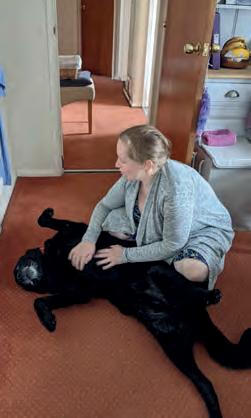
I wasn't happy when my mum and Emma said I could have a fridge, but no food was allowed in this. I wanted to do my own shopping and fill the fridge. I now understand it's not a good idea, so I plan for each day with my sister, and we only have what I need for the day in the fridge. Mum cooks dinner at her house and then she brings it round to me, or sometimes we all eat together.
With my support from my personal assistants, I count calories to keep my weight down, go to the gym, attend Zumba and Stretch and Tone classes. I attend adult education for maths and English skills and go to an art class. My support helps me to be part of my community, to use the local bus routes, to attend my volunteer job, complete my housework skills, go to the theatre and cinema and play board games in my new home.
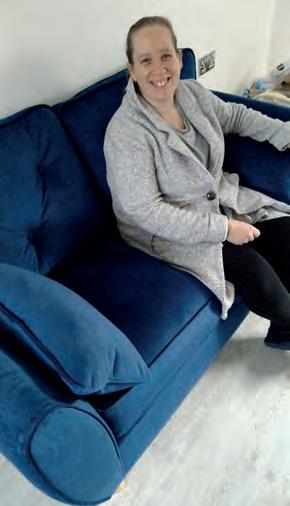
I really like living in my new home. Mum always comes round, and I make her a drink with my coffee machine. I do miss our dog, Moss - he doesn't come round that often as he's getting an old boy.
It's nice to have my own place as I can have my friends over.
by Sarah Brindle
Friday 19th, the weather could not have been any more amazing and the resident ducks on the park were out on patrol as we approached our home from home for the weekend.
Once we had unloaded, we made our way quickly – okay, maybe not that quickly (navigating the site was not that easy) to the welcome meeting to greet all the amazing families. Drinks and conversations, excited people, crafts, felt tips at the ready, conversations flowing.
Saturday, we were awake with the sunshine and set off to explore the caravan park on our duck trail, shouting ‘quack, quack’ every time we saw a duck. We may have got a little excited and slightly off our route, but it was all good fun and getting slightly lost just meant we had completed more steps and earned our drink afterwards.
Later, we made our way downtown to the seaside where everyone had the opportunity to explore the area, go into the aquarium for a massively reduced price, and play crazy golf and see the dinosaurs – so BIG shout out to them and even bigger THANK YOU to Skegness Aquarium for their generosity.
We had our lunch in the sunshine sat by the boating lake, whilst the ducks surrounded us eagerly waiting for leftover bread.
In the afternoon, we fired up the barbecues and lined them all up alongside the caravan - everyone brought their own food and enjoyed each other’s company. Conversation was flowing and children played with the outdoor activities and at the nearby park. It was a real sense of community and family, sharing stories, ideas and making lifelong connections and friendships.
Later, families enjoyed the entertainment on site and arcades with lots of dancing, fun and laughter. We had a boogie on the dance floor and a go on the arcade machines.
Sunday, we waited to see who might want to join us for another early morning “let’s see if we can get lost again, walk around the park”.
The turnout for this was low but that was okay, as most people were exhausted from all the fun of yesterday and took the opportunity to recharge ready for our “Go Orange Ball” and – WOW! - what a ball we had. Parkdean had kindly decorated the stage – amazingly, pulled out all the stops so another BIG shout out to Parkdean!
The room was a busy display of orange, tables displayed orange balloons with music, karaoke, dance floor, arts and
by Karen Wilkinson
I was lucky enough to be able to attend the family weekend at Sundrum Castle in Ayr. It was a fantastic weekend with 50 of our community coming together to share fun and activities as well as meeting old friends and making new ones.
We are already preparing for the weekends next year so if you are interested, please contact us for more information.
crafts, nail, and hand massage bar, and a quiet corner for those that needed a little down time. A few people tied the orange balloons to themselves, so they stood out even more orange! And, of course, everyone got an orange fun bag, stocked with lots of goodies.
Evening shenanigans resumed at the park’s entertainment lounge, and we finally hit our beds to sleep the day’s adventures off and get ready to say our goodbyes in the morning.
We had so much fun that, before we left on Monday, we booked our caravan for May 2024.
We want to thank you all for coming to the weekend, you are all amazing and the weekend would not have been the same without you all.
One of the mums summed the weekend up beautifully by saying: “We might not be blood-related family, but we are chromosome-related family”.
We are super excited to see you all again and hopefully many more PWS families. Bring on PWSA takeover Skeg Vegas 2024!!
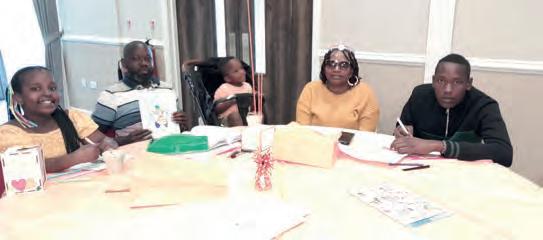

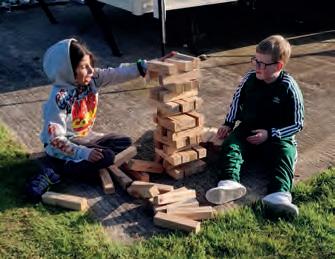






For this quarter’s Research Corner, we are pleased to welcome Suzannah Lester from the research team at the Department of Psychiatry at the University of Cambridge, who has provided this update that we hope you will find useful and informative.
We wanted to take a moment to update you all on our research, and to share some exciting news with you! Firstly, thank you to everyone who has participated in our research, we would not be able to do it without your support. However, we also know there are many people with PWS who would like to participate, but have not had the opportunity to do so. We know there can be many factors that make participating in research difficult, so if you would like to take part, please do get in touch and we will endeavour to help you overcome any obstacles. Our first piece of exciting news is that our wonderful researcher, Dr Lucie Aman (pictured), has just successfully completed her PhD investigating psychosis in PWS.
care homes and, of course, the constant and unwavering support of the PWSA UK.
Preliminary results show that people with PWS at risk of psychosis (those with the mUPD subtype) tend to process sensory information differently to those not at risk with the deletion subtype.
Funding updates
In the last few months, our team has been successful in securing several research grants to support our PWS research. Suzannah Lester secured funding from FPWR to continue researching psychosis in PWS using MRS, and will undertake this as her PhD. After nearly five years of working in PWS research, Suzannah feels incredibly fortunate to be able to continue her passion in PWS research as her PhD, and is very much looking forward to getting back into the lab and meeting old, and new, participants – the best part of the job!
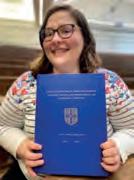
Lucie’s PhD, funded by Sam’s Foundation and the Foundation for Prader-Willi Research (FPWR), investigated and developed cutting-edge methodologies to explore why people with PWS might develop a serious psychotic illness. These illnesses, once properly diagnosed, can be treated with existing medications but if we better understood why some people with PWS are at risk, such treatments could be improved, and we might be able to prevent them in the first place.

Her research included electroencephalogram (EEG) experiments, designed to measure electrical activity generated by brain neurons, to explore brain functioning. In addition, magnetic resonance spectroscopy (MRS), using an MRI machine, measured important chemical levels known to play a role in psychosis, within specific areas of the brain. A final part of the study measured IQ, and used online games to help assess how people with PWS perceive their environment. The online section was added during the COVID-19 pandemic, and enabled Lucie to collect data while in-person experiments were not allowed.
An incredible 19 people with PWS took part, with many others still signed up! This was only made possible by the wonderful participants, their amazing parents and carers,
Parents and carers needed for PWS research project
Cerebra’s BEOND project is asking for parents and carers of people with Prader-Willi syndrome aged 1 and above to take part in a survey-based study. The study can be done online (and you can save it as you go along so you can dip in and out when you have the time), or you can request a paper copy to complete as and when you can. The study completed online in one go should only take up to one hour.
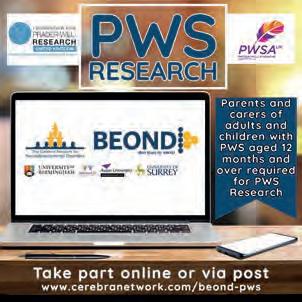
Dr Lucie Aman also acquired funding from FPWR enabling her to continue the research she undertook for her PhD. Ideally, she will be looking to test more individuals with mUPD, to better understand causes of psychosis in PWS, and differences between the subtypes.
Dr Stephanie Brown obtained funding from FPWR to investigate the neurobiology of hyperphagia in PWS. Stephanie was aware of new advances in brain scan analysis that made it possible to visualise the hypothalamus and measure the size of its different nuclei. She found that in people with PWS, the hypothalamus was much smaller than in people of a similar age who did not have PWS. This will be the first time this new research has been undertaken in PWS and it is hoped it will provide a better evidence-based understanding of the underlying brain processes that lead to overeating, increasing the likelihood of effectively targeted future treatments.
How can YOU help!
In September of this year, both Dr Lucie Aman and Suzannah Lester’s research will commence. We will be looking for individuals with PWS to spend an interesting and enjoyable day with us at our research facilities in Cambridge. More details will be available in the next month, but if you, or someone you support with PWS, would like to find out more, please do contact Suzannah Lester at sl910@medschl.cam.ac.uk.
This is looking at the behavioural, emotional, physical and mental health of people with PWS (and other genetic syndromes, neurodevelopmental disorders and intellectual disabilities) to gain a better understanding of any challenges faced and try to then develop better methods of support.
The hope is to also repeat the study again in the future to revisit the families who take part to monitor any changes.
FPWR UK and PWSA UK are both really excited about the study and grateful for Cerebra for their work on PWS. The more participants that take part, the better their data and we would really urge everyone who can to take part.
If you would like to take part, please visit: www.cerebranetwork.com/beond-pws
Thank you to everyone who took part in this year’s PWS Awareness Month – whether you held a fundraising event, a special assembly, or joined us in Going Orange! Here are some of our highlights.
Thank you to Aida and Tiffany Saraiva who helped raise awareness of PWS, as well as funds for PWSA UK, within their local community. This included baking cupcakes and selling them at their local church, Tiffany’s school and Aida’s school. They also went to their local Sainsbury’s on 27th and 28th May to hand out PWSA UK leaflets and talk to people about PWS in order to raise more awareness and funds.
Thank you both for your fantastic efforts!
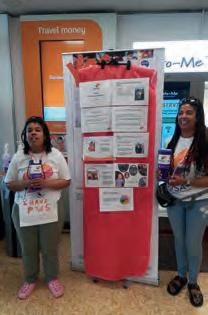


Springfield Primary School celebrated PWS Awareness Day on 26th May by wearing orange. The school has a child with PWS in its reception class, and the child’s brother in another class –and the brother spoke to his class about what PWS is. Then, together they stood up in assembly and helped explain what PWS is to the rest of the school, how it is something that makes people’s bodies work a bit differently and how everyone is different, but just as special as each other.
You may be aware that there are two PWS charities in the UK. PWSA UK and the Foundation for Prader-Willi Research UK (FPWR UK). Why is this the case?
FPWR UK is solely dedicated to funding research into PWS – looking for drugs, therapies, and strategies that will change the future of PWS and give hope to all those affected. PWSA UK provides a helpline for those in crisis or needing help, mediation and support, as well as connecting families across the UK and providing information and training for professionals working with those with PWS in order to make day-to-day living with this syndrome more manageable.
Catherine Shaw, Chair and founder of FPWR UK, and Jackie Lodge, the new Chief Executive of PWSA UK, have met to discuss how the two organisations can work together to support the PWS community and further research to help eliminate the main challenges of PWS.
Catherine said: “We already know the PWS community is small but mighty. Collaborating is going to make us an even more powerful force to be reckoned with. This is a positive step for all those affected with PWS, giving a beacon of hope for the future.”
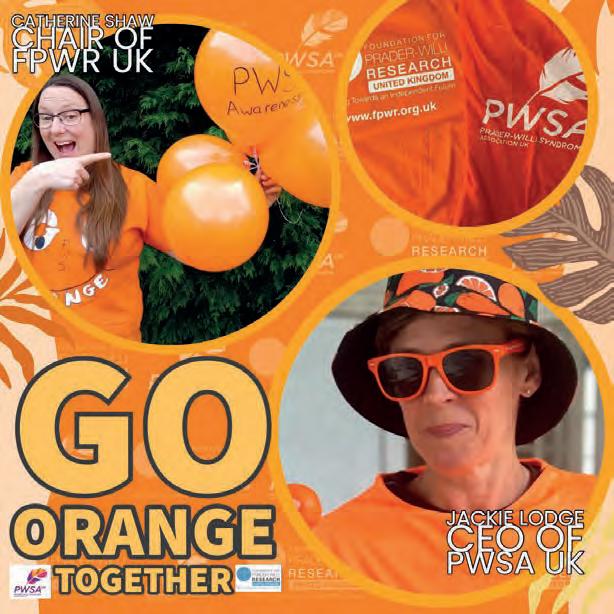
Jackie said: “It is a hugely exciting time to join the PWSA UK, but there are many challenges that face us as a community. It is ever more important that we collaborate and share our skills and knowledge. We can achieve so much more together!”
Catherine and Jackie kicked off this new collaboration by going orange together to help raise awareness!
You can see photos from our community weekend at Southview Holiday Park, Skegness, elsewhere in this magazine, but we thought we’d share pictures from the Go Orange party we held there on this Awareness Month page.
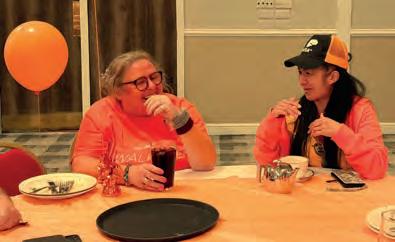
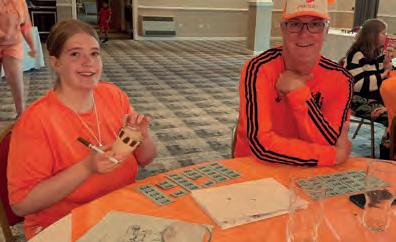
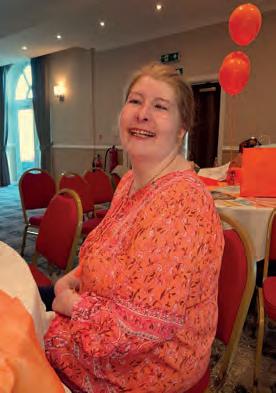
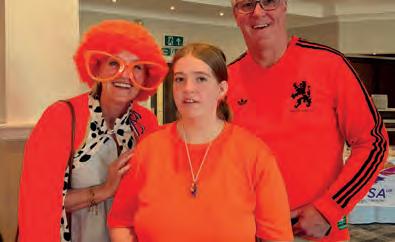
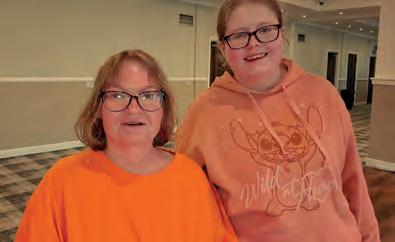
Thank you to everyone who in our amazing community who went orange for PWS – and as you can see, Team PWSA UK got in on the act too!
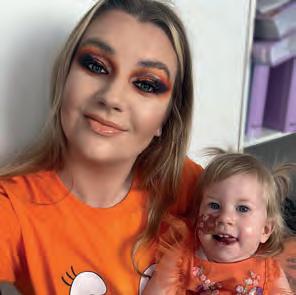
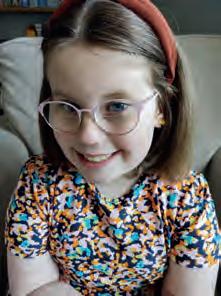
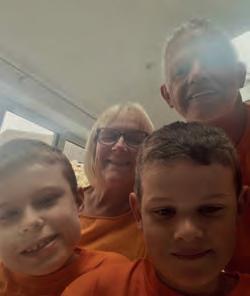
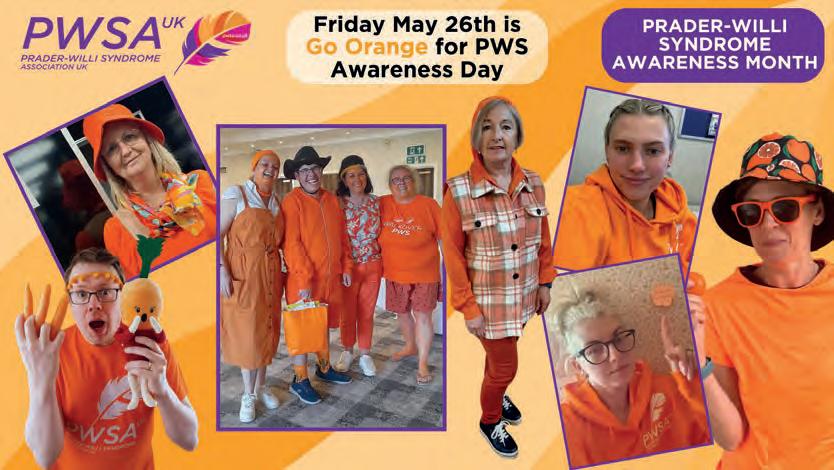
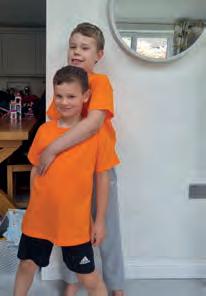
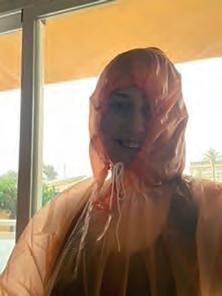
A huge thank you to students and staff at Bladon House School, who have raised more than £2,000 for PWSA UK by completely a marathon on a treadmill as part of their Go Orange Day celebrations!
A fantastic effort from everyone! The school also held an assembly about PWS, which included the experiences of some of its pupils with the condition, as well as an art competition to design a PWS awareness poster.
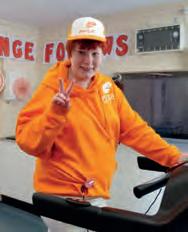

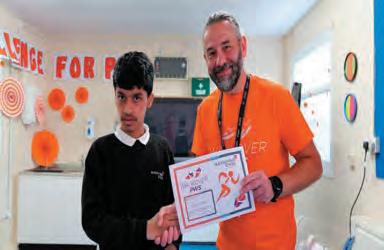
Kayra Afriyie
Grace Cullen
David-Andrei Damian
Caitlin France
Estelle Gallagher-Ball
Meharaj Gill
Kacy Haig
William Heath
Arlo George Jackson-Standley
Marley Krajewski
Maisie Morey
Magnus Rankine
Ruby Sterling
Katie Thakkar

Alexander (centre, front row) with family and friends during a tour of Crystal Palace’s stadium for his 50th birthday. Ivan is third from the left on the back row
Ivan Scott is a name that will be familiar to many families in our PWS community, particularly those involved in the earlier years of the Association. A founding member of PWSA UK, and father to Alexander, 54, who has PWS, here Ivan shares his memories of his son’s birth, eventual diagnosis and the formation of the Association.
The Scott family of Burnham-on-Crouch’s knowledge of Prader-Labhart-Willi syndrome goes back to before PWSA UK was formed.
Ann (30), Ivan (30), Susanna (7), and Joanna (6), were expecting a normal baby to arrive mid-February 1969, but nothing happened. By early March, Ann was rushed into Chelmsford Hospital because every time she had a contraction the baby’s heart stopped beating.
Alexander John was born on 4th March 1969 by caesarean operation with his hands folded back up his arms, his feet folded back up his shins, and no muscle tone. The hospital had never heard of Prader-LabhartWilli syndrome, as it was known then, and he was classified as having cerebral palsy.
His hands and feet gradually took up normal positions and he rolled around at 18 months and walked by 30 months with a baby “brick cart”.
For the first few years of his life, he was under the local Burnham-on-Crouch doctor and Chelmsford Hospital, and finally, at about age three, was sent to Great Ormond Street Hospital, where he was seen by Dr Newns, Dr Lawrence’s predecessor, and Dr Lawrence had a houseman named Ross Ellis – we’ll come back to him. By then, Dr Labhart had dropped out of this research and Alexander was diagnosed with Prader-Willi syndrome. We were advised at the time not to contact other PWS families as this could cause distress.
When Alexander was seven, we moved to Bromley, Kent, as there was no schooling for him within 20 miles of Burnham-on-Crouch, and the doctor we were given was
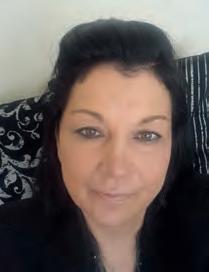
We are delighted to welcome Sarah Brindle to Team PWSA UK as our new support and training officer. Here’s Sarah to tell you a bit about herself:
“I have dedicated my career towards supporting people who are struggling to have their voices heard and their needs met. My grass roots are
Ross Ellis.
We carried on alone with help from the three sets of doctors until a programme appeared on television about the boy who could not stop eating (remind you of anyone!), when viewers were requested to write in for more information.
A meeting was set up (about 1982) and we were one of the 32 families that attended, and from that came the original Prader-Willi Syndrome Association (UK). I was co-opted on to the committee as I lived in London where the early meetings were held. I served on the committee for about ten years.
When he was 23 years old, Alexander became the first person with Prader-Willi syndrome to attain Duke of Edinburgh Bronze, Silver and Gold awards. He was presented by Prince Philip and had a short chat with him. Gradually, the PWSA UK brought in donations and sales starting with some rather poor Christmas cards that I sourced at 10p each. Quality and range increased and the Association has gone from 32 members to many, many more with annual conferences, regional groups and more. Unfortunately, I was not built for commerce and stepped back, but have supported the Association wherever possible.
Alexander has never been able to work, but has been a Crystal Palace season ticket holder for over 35 years. On his 50th birthday, we did the whole stadium tour and Alexander presented the Man of the Match bottle and received a team shirt.
At 54, he is ploughing on and, with his sisters, attends every home game, and some away games.
Good luck to those who presently run and support the Association.
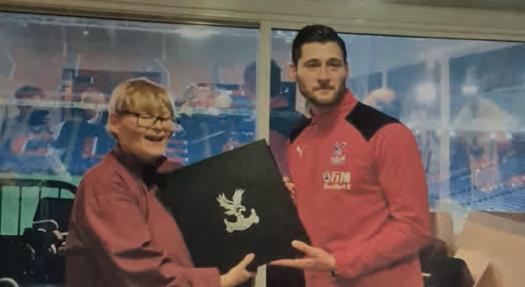
working with people with learning disabilities, and I have over 20 years' experience working in the charity sector. I have previously worked with men and women in high and medium secure units, mostly on forensic sections, as well as PICU units and adolescents on sections of the MHA. I was previously the manager for a national advocacy provider covering the entire north west region. I am delighted to be joining the PWSA community and bringing my knowledge, expertise and experience and sharing this with you and supporting through our journey together for however long is needed.”
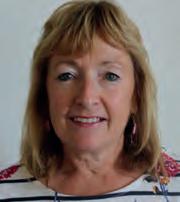
Well, what an exciting time we have been having recently. Our new CEO, Jackie, started and came to join us for one of our biggest events, the London Marathon. Jackie, like me, has run the marathon so she knows all about the long hours training, losing toenails, raising funds etc, and it certainly makes you feel for those taking part.
We had a strong team this year, with one person from Poland and one from Colombia, both new countries for us. We also had a brilliant team from the UK. All of them completed and seemed to thoroughly enjoy the experience.
Thank you to all our fantastic runners in this year’s London Marathon – let's hear from a couple of them now:
Jorge Forero, Colombia
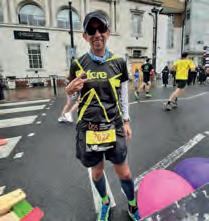
“Running the 2023 London Marathon, and supporting the PWSA UK was an incredible and memorable experience. One of my purposes in life is to fundraise money to support research that will lead to new treatments for PWS. I run marathons supporting this great cause, and I think, together we can improve, through the running, the quality of life and the ability to live independently for people with PWS. Many thanks to the PWSA UK team for all your support. Please keep working hard as you are doing.”
Sarah Lynch
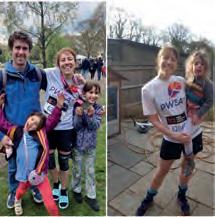
“Running the London Marathon for PWSA UK has been one of the most exciting and rewarding experiences. I ran for PWSA UK as my daughter, Alice, was born in 2018 with the condition. I therefore appreciate first-hand how important their support for families like mine is. On the start line I met Erin Burnett, also running for PWSA UK and her cousin, who has PWS. We set off together feeling excited but, as neither of us would class ourselves as runners, a bit apprehensive too.
“Running was such an amazing experience, the crowds were amazing at cheering us on, and running over Tower Bridge was definitely a highlight. There were, of course, some tough bits; when I got to Karen and Jackie from PWSA UK at mile 20 I could not feel my legs and had hit the dreaded wall. However, as the last 6.2 miles went by, I started to recognise more and more landmarks: The London Eye, Big Ben and finally Buckingham Palace, I picked up again and ran as fast as I could manage to the end. The whole experience was just incredible and I thoroughly recommend it to anyone. I only started running when I got the place in November: if I can do it -
It was lovely to have some fellow PWS supporters come and cheer all the runners on. It is a great event to attend and it would be lovely if some of you wanted to join us next April. It really spurs the runners on to have spectators cheering them on. It was particularly wet this year, with so many male runners with bleeding nipples due to the friction from their tops. It literally brought tears to your eyes thinking of the pain, although I guess everything aches by the end of the run so one more thing doesn’t really make much difference!
We have six gold bond places this year so if you are interested in joining the PWS team please let me know kwilkinson@pwsa.co.uk
Thank you, Karen
you can too!
“Although I am still buzzing from running, the most important and rewarding part has been raising so much money for PWSA UK: the target was smashed, and I've raised over £5000 which I know will make a massive difference and makes all the hours training well worth it!! Finally, I just want to say a big thank you PWSA UK and Karen Wilkinson for the opportunity. Thank you also to everyone who donated or helped me; especially my husband, Tim, and friend, Mel, who spent many hours on childcare duties with our four young children - they even ran the odd hot bath too!“
And a BIG THANK YOU to all our other runners!
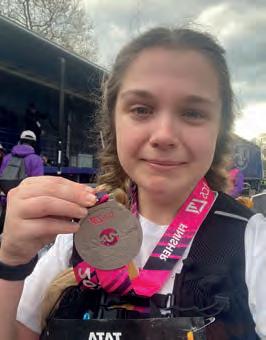
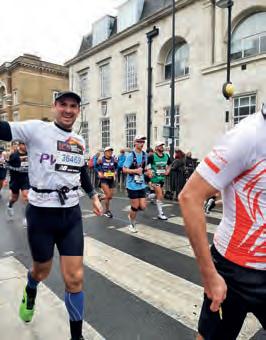
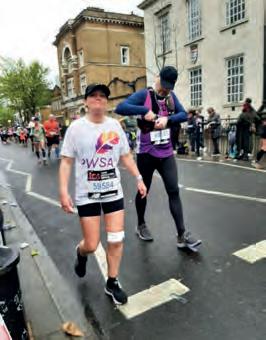
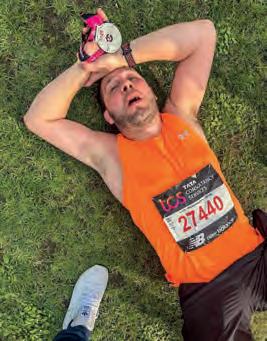

Nikki and her team organised an amazing event at the hotel and managed to sell all the tickets. A great time was had by all, and they raised £1,830, for which we are very grateful!

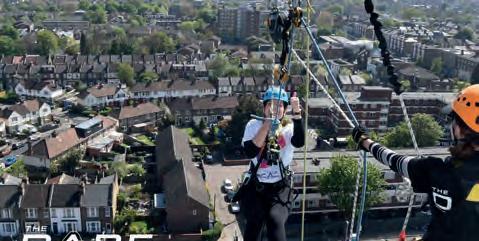
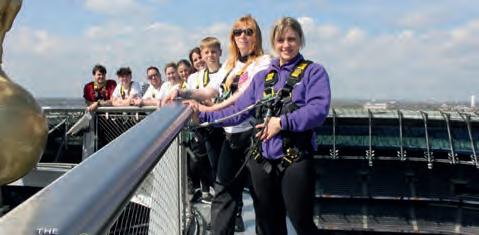
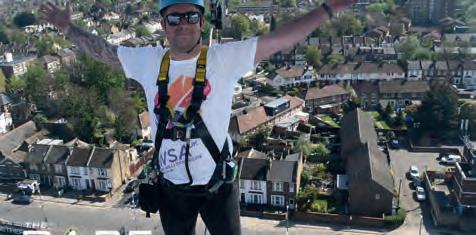
by Lizzie Pratt
On the 29th of April, a small but mighty team of nine took on the Tottenham Hotspur Skywalk… with a twist.
We are always looking for new challenges to take on and when we saw the Tottenham Skywalk, we knew it was for us. Central, accessible, and most importantly fun! The Tottenham Skywalk is a climb up the side of the famous Hotspur stadium to a platform 46m high that surrounds the golden cockerel.
The big day arrived, and we made our way into and across London, meeting at White Hart Lane. Although we had never met before, I spotted the white T-shirts and feather logo a mile off. The sun was shining, and it was a beautiful spring day.
We took some pictures and headed up for our 13:25 safety briefing. This is where the twist comes in… we heard ‘does anyone want to upgrade and abseil back down’ everyone looked at each other waiting for the first one to volunteerI’m not sure who put their hand up first but slowly one by one the hands went up, that’s when I thought “I can’t not do it, I am representing the Association”, and my hand was in the air too.
We put our special shoes on, silently watched the safety video and headed outside to put on our harnesses. More pictures were taken and then we started our climb. The walk was steep, but the excitement was enough to distract us. The tour guide was telling us some interesting facts but, to be honest, I was too nervous to listen to what she was saying.
Finally at the top, there is a big area for pictures, and you can even buy drinks if you like. The view was phenomenal, you could see for miles - you forget how many trees there are in London! Then we were strapped in to walk up to the glass platform round the cockerel. Now, here is a fact I do remember: the cockerel that is at the stadium now is an exact replica of the original and all the lumps and dents are exactly the same.
This is where the super scary part comes in. We make our way back down to the first platform where they ask the people who are abseiling to step aside and put on a helmet. In pairs, we are strapped up and one by one lean over the edge. You could go down either facing forward or backward and a few of the braver people did go forward, but I chickened out. You must put complete trust in the ropes and the people who work there and lean all your weight over the edge, leaving just your toes holding on. Then you let go.
Once we were all down by abseil or stairs we headed into the shop and got our souvenir pictures, said goodbye and thank you again and we all went our separate ways.
This was another unforgettable fundraising experience; I love taking part in these types of events, as they provide an opportunity to meet members of our community. Events are another great way to raise awareness for the Association, as we all had our T-shirts on, and we had so many people ask why we were wearing them.
Once again, I want to say thank you to the amazing team who took part and thank you to everyone who donated. So far, we have received over £2,450 plus Gift Aid.
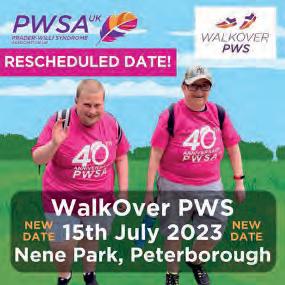
In May, we had a great meeting in London with Colette Brown, formerly an actress in Holby City and now a producer. Colette used to be an ambassador for the Association and is going to come back and support us in the future. Colette and her family will be attending our WalkOver Nene Park on 15th July 2023. If you are interested in joining us please contact kwilkinson@pwsa.co.uk
A huge thank you to Jamie Mole who took part in this 100-mile bike ride and raised £1,805. His niece has PWS and he wanted to support PWSA UK.
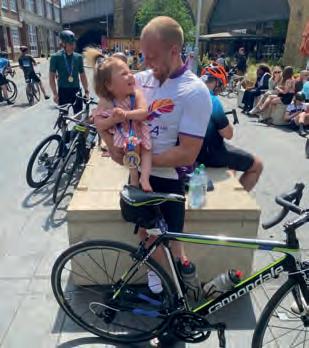
We are pleased to have received a donation of $5,000 (£3,909) from GFI, raised during its Charity Day in September 2022. Donations like this are a lifeline for the Association so a huge thank you to GFI.

Thank you to Louis Barrett, who raised £654 for PWSA UK by running the Hackney Half Marathon on 21st May. Louis’s younger brother, James, has PWS, so Louis wanted to do something to help support the work we do here at PWSA UK.

On Saturday 10th June, colleagues from across Shield Services Group’s branches gathered at Bath Racecourse to celebrate their first get-together since the pandemic and raise vital funds for PWSA UK.
Over 1,500 colleagues, family members, clients and contractors attended the event, enjoying live entertainment throughout the day along with fair rides, children’s entertainers and street food, raising £5,000 for PWSA UK.
Luke House, Chairman of Shield Services Group, reflected: “It was wonderful to see so many of our Shield colleagues present, along with their family members, our clients and contractors, for the first Shieldfest in a few years. It’s our biggest and best yet and I want to thank all of our team who have put so much time and effort into organising such a wonderful event, all in aid of PWSA UK. I loved the fact that so many of our Shield family brought their loved ones along to join our celebration. It’s really motivating to see our family values run through everything we do. I would really like to thank our suppliers for donating such a great selection of prizes for our charity raffle.” Shield would like to say a huge thank you to the following suppliers who kindly donated fantastic prizes to the draw:
SMH Products Ltd, KN Office Supplies Ltd, Electec Solutions Ltd, GF Autos, Dynamic Signs Ltd, National Windscreens, Lavean Services, PSB Hire and Sales, Pearce Brothers Ltd, TrakM8, Sword Dynamic Services Ltd, Vehicle Accessories, Pinnacle Ltd, Precision Developments, SHG Systems, Moorland Environmental Ltd, ADI, City Electrical Factors, Denmans, Walsall, Sylvania, Hikvision.
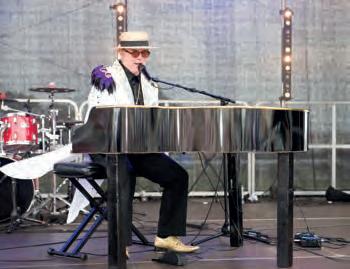
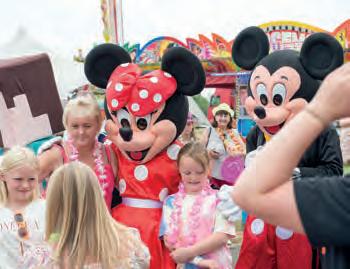

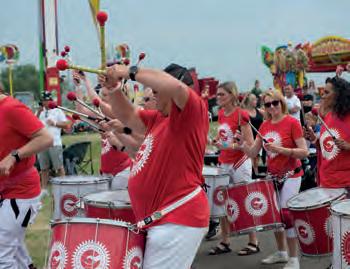
We have a range of events coming up, which you can see on the back page of this magazine and by visiting pwsa.co.uk/ events, and if you are interested in attending any please do get in touch with me at kwilkinson@ pwsa.co.uk. These events are one of the biggest parts of our fundraising in the year. Without events like these we would not be able to support our PWS community with things like the Helpline, Facebook, the website and also all the events, meetings and conferences we provide.
If you feel you would like to either run your own event, take part in an event or join us in one of ours we are here to help you. Lizzie and I can offer support, information and items please just let us know.
Simon Amey, Hannah Bashir, the Bond Family, Raffaella Brunetti, Frances Bush, Peter Colgate, Paige Flynn, Maureen France, Kerry Gunn, Hayley Hamilton, Rachel King, Lisa Lemenille, Philip Minton, Patricia Morfitt, Mike Sloggett, Kalpana Sawant, Rachel Taylor, Enrica Vaschetto, Gordon Weingarten, Sarah Wheeler, Natalie Yapp
Many thanks to all individuals and organisations for their support of our work, and to all those who have fundraised on our behalf. Without you, we couldn’t carry on.
Events & Fundraising Activities
Acle Women’s Institute, Louis Barratt, Sarah Brown, M H Bury, Chris Clowes, Jane Evans, Rose Felloni, Penny Franks, Jo Gambi, Sukhdeep Gill, Graeme Griffith, Laura Holland, Claire Ross-O’Hare, Lindsay
A huge thank you to Alan Auld, dad to Iona, who is currently preparing to undertake four mammoth swimming challenges in aid of PWSA UK, including the English Channel!
Alan is currently in training for the following:
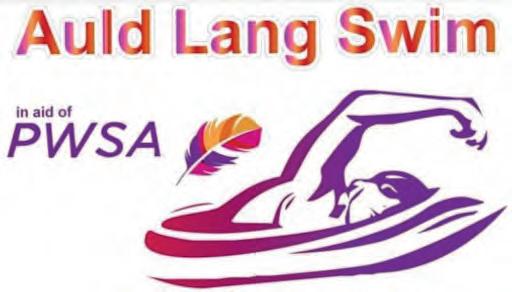
24th June - Lake Coniston, 5.25 miles
15th July - Lake Ullswater, 7.5 miles
16th August - solo crossing of English Channel, 22+ miles
2nd September - Lake Windermere, 11 miles
Alan says: “Anyone who knows me, knows I love a challenge. This year I will attempt to complete my toughest challenge ever whilst raising awareness and funds for PWSA UK, a rare genetic syndrome which my daughter Iona suffers with. The training and actual swims will be tough however nothing compared to what my daughter endures on a daily basis.”
You can support Alan via his JustGiving page at www.justgiving.com/page/alan-auld-1678901772820
Hunter, Grace James, Julie Mitchell, Jamie Mole, Linda Millington, David Palmer, Sue Newton, Mr & Mrs Paulley, Pep the Poet, Penn Divet Diggers Golfers, Maria Roden, Mr & Mrs E Rylance, Aida and Tiff Saraaiva, Scallywags
Childcare Centre, Trudie Smith, Jonathan Stanlan, Roy Standley, Rebecca Squires, Andrew Sutcliffe, Mrs Flora Wilson
London Marathon Runners
Erin Burnett, Martin Clifford, Jorge Forero, James Halford, Sarah Lynch, Jennifer McGuire, Przenyslaw Ponikowski.
Companies
Cargill
Lotto
Corin Ltd
Bladon House School Wetherbys
Nursery Rhymes Leicester Tesco
Sainsbury’s
Sta Mark’s Church Woodfield School
Collett School
Park Fisheries
Knickerbockerglory.tv Aviva
Trusts
Better Breaks Scotland Ardwick Trust
F.B. Coales No. 4 (Family) Trust
Inchcape Foundation
Muriel Jones Foundation
In Memoriam
James Winstanley
Tracy Clark
Winnie Humphries
Our grateful thanks also go to all members and friends who fundraise on our behalf and donate by other means such as standing order, payroll giving or anonymously.
Silver Corporate Member
Eccles Finance
Lifetime Members
Ann Taylor
John Baker
Nicholas Bond
Rosemary Booth
Elizabeth Boynton
Judith Brandon
Paul Brandon
Richard Brindle
P Bulmer
Nathalie Charlton
Doreen (Jane) Crellin
Andy Cunis
Jennie Cunis
Lene Cunis
Richard Cunis
Peter Davis
Dorothy Dawson
Edward Dawson
Catherine Docherty
Jane Evans
Andrew Graham
Pavlina Gray
Myra Greenhalgh
Kate Grussing
Teresa Hills
Professor Tony Holland
Jane Ireland
Jeremy Ireland
Maria Jordan
Jamie King
Danny Leslie
Rae Lowe
Peter Madagan
Sally Madagan
Ian Mitchell
John O’Dell
David Palmer
Rodger Perks
Jean Phillips-Martinsson
Princess Michael of Kent
Keith Simpson
Andrew Smith
Jan Taylor
Jill Wilcox
Please note that the information below was correct at the time of going to print. For the most up to date information, please visit pwsa.co.uk/events
July 2
Parallel Windsor 2023 at Windsor Great Park, and virtual. Please contact Karen at kwilkinson@pwsa.co.uk for more details.
15 PWS WalkOver at Nene Park, Peterborough. Please contact Lizzie at lpratt@pwsa.co.uk for further information.
24 PWSA UK Community Event at MOD Lyneham, 10am-3.30pm. Find out more and book your free places via our online events page
August
13 PWSA UK Community Event at Waterways Farm, Norfolk, 11am-3pm. Please contact Patsy at plecont@pwsa.co.uk for further information.
13 PWSA UK Community Event at Blair Drummond Safari and Adventure Park, Stirling, Scotland, 11am-3pm. Find out more and purchase your tickets via our online events page
September
10 Great North Run. Entry to this event is now closed.
17 Scafell Pike. Please contact Karen at kwilkinson@pwsa.co.uk for more details.
22-25 PWSA UK Family Weekend at Sandy Balls, Hampshire. Find out more via our online events page.
26 Zoom webinar on dietary issues with Chris Smith, 8pm-9.30pm. Details to follow.
October
2 Parent to parent Zoom support group for parents of children aged 4-8. Details to follow.
19 Parent to parent Zoom support group for parents of children aged 8-15. Details to follow
22 Parent to parent Zoom support group for parents of children aged 0-3. Details to follow.
November and December
Details of events to be confirmed.
